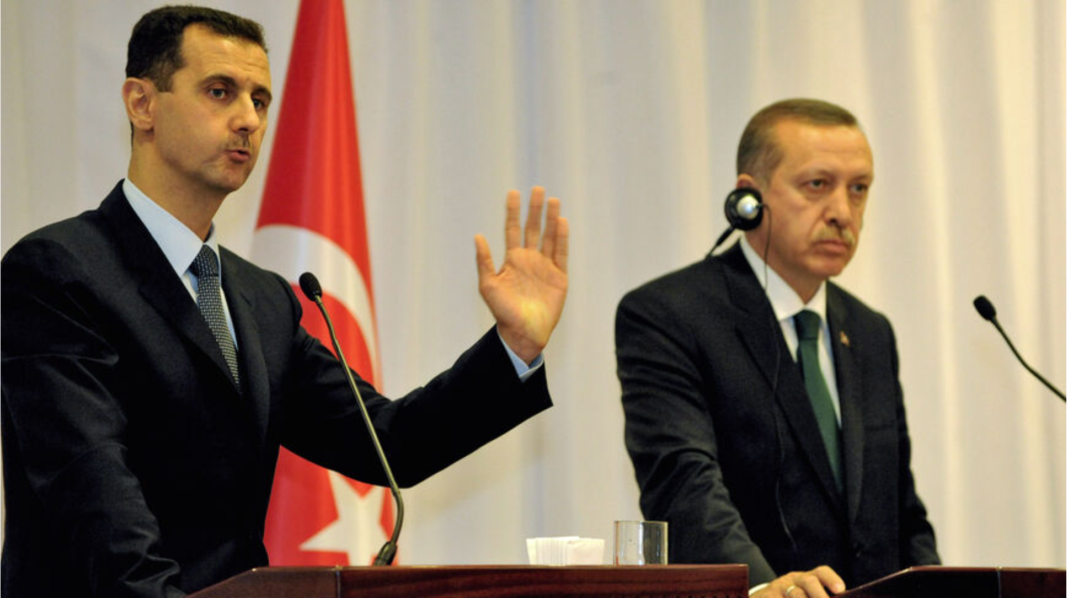Ankara’s cross-border incursions and control over northern areas complicate talks, Ayla Jean Yackley’s analysis in Financial Times on February 5, 2023.
Turkish President Recep Tayyip Erdoğan once embraced his Syrian counterpart Bashar al-Assad as “my brother” and hosted his family at a holiday resort. But since the Syrian civil war started in 2011 the friendship has crumbled and the leaders have found new names for each other — including “thief”, “terrorist” and “butcher”.
However, after years of calling for regime change in Damascus and backing the armed opposition, Ankara appears ready to shift its stance once more, with Erdoğan last month saying he would soon meet Assad to “pour oil on troubled waters”.
Coaxed by Assad’s main backer Russia, the neighbours are inching towards normalising relations, according to Turkish officials. Their defence ministers and intelligence chiefs held talks in Moscow in late December, and Turkey’s foreign minister Mevlüt Çavuşoğlu has said he will meet Syrian counterpart Faisal Mekdad “as soon as possible” to pave the way for a presidential summit.
There are incentives for both sides. For Assad, talks with the head of a Nato country would ease his international isolation, while the prospect of rapprochement could boost Erdogan’s support in presidential and parliamentary elections likely to be held on May 14, say analysts. A severe economic crisis has intensified public hostility towards the 4mn Syrian refugees in Turkey, and a potential easing of tensions has raised voters’ expectations that they may return home.
Erdoğan has repaired relations with other former foes in recent years, including Saudi Arabia, the UAE and Israel, hoping to revive trade ties and boost Turkey’s economy. But reconciliation with Syria could prove more intractable, analysts say. “There is zero trust between the two sides and neither can easily make the concessions that rapprochement would realistically require,” said a retired Turkish diplomat.
Ankara turned against Assad over his brutal response to the 2011 uprising, which sparked the refugee exodus. The country became the main sponsor of Syrian armed opposition groups, but as Assad retained his grip with the support of Russia and Iran, Turkey broadened its focus.
Since 2016 it has mounted a series of cross-border operations against Islamist militant group Isis and the Kurdish-dominated Syrian Democratic Forces. Its troops control swaths of the north, covering 5 per cent of Syrian territory and a quarter of the population.
Turkey says the SDF, which the US backs in its fight against Isis, is an offshoot of the Kurdistan Workers’ party (PKK), which has fought a four-decade insurgency against the Turkish state. Ankara, the US and EU have designated the PKK a terrorist organisation.
Syrian opposition fighters armed and trained by Turkey have helped Ankara fight the SDF. The Turkish military has also fought to keep Assad’s forces out of the north-west province of Idlib, the final rebel stronghold, where more than 3mn people who fled areas recaptured by Damascus have sought shelter.
Damascus insists Turkey must pull out of Syrian territory before relations are normalised. “We cannot talk about resuming normal ties with Turkey without removing the occupation,” Mekdad said last month. For its part, Ankara is threatening a new offensive against the SDF.
“Even though Turkey is able to make a sudden U-turn, the other side may not respond with the same agility,” said Senem Aydın-Düzgit, a professor of international relations at Istanbul’s Sabanci University. Assad might “first want to see what will happen in Turkey’s elections, making an agreement in the short term very unlikely”, she said.
Turkey’s defence minister Hulusi Akar has sought to reassure Syrian opposition groups that Ankara will not make peace with Assad at their expense and that it remains committed to Idlib. Thousands of Syrians in territory controlled by Turkey staged rare protests against any rapprochement between Ankara and Assad following the Moscow talks.
“It is out of the question for us to do anything against our Syrian brothers,” Akar told the Financial Times in January. “We are [in Idlib] to put an end to the humanitarian tragedy and prevent new migration to Turkey due to a crackdown [by Assad].” He said he had proposed working with the Syrian regime in “the struggle against terrorism”.
Turkey wants Assad to turn on the SDF, which has moved closer to Damascus in the face of Turkish attacks. Following the Moscow talks, the US said it opposed governments upgrading relations with Damascus. It has also warned Turkey against a new ground operation in northern Syria.
Erdoğan has close ties with Russian President Vladimir Putin, with whom he shares a mistrust of the west. Russia has troops in northeastern Syria and has opposed Turkish attempts to launch another offensive against Kurdish fighters.
But Galip Dalay, a non-resident senior fellow at the Middle East Council on Global Affairs, said Turkey saw the talks with Syria as “increasing, rather than eliminating, the possibility of another military operation. It expects a green light from Russia in exchange for negotiating with Syria.”
Back in Turkey, polls show Erdoğan’s Justice and Development party is struggling to retain support against an opposition alliance that has pledged to send refugees home and fix the economy. A December survey by Turkish researcher Metropoll showed 59 per cent of Turks supported talks with Assad.
“Security and foreign policy are Erdoğan’s strong suits, while his weak points are the economy and refugees. Before the election, the government needs to create the perception that the process of refugee returns is starting,” Dalay said.
The main opposition Republican People’s party (CHP) has long lobbied for normalising relations with Assad as a step towards repatriating the refugees. By adopting his political rivals’ playbook, Erdoğan seems to have wrongfooted his opponents, observers say.
The CHP “has always insisted on dialogue between Ankara and Damascus”, Ünal Çeviköz, a CHP lawmaker and its foreign policy adviser, told reporters recently. “Now that the government is doing that, how can we say, ‘Don’t’?”
Financial Times, February 5, 2023, by Ayla Jean Yackley.

